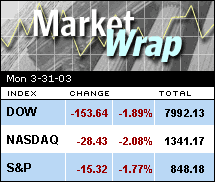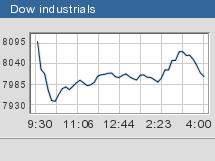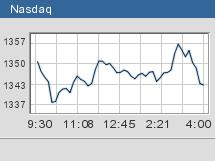NEW YORK (CNN/Money) -
U.S. stocks sank Monday, but ended the month on an up note, as talk of a protracted war and a report showing weakening manufacturing activity had investors on edge.

And stocks likely will continue to spin on the heels of war news and a larger report on U.S. manufacturing activity on Tuesday. Whether investors will be fooled on April 1 has yet to be seen.
The Dow Jones industrial average (down 153.64 to 7992.13, Charts) shed 1.9 percent Monday, while the Nasdaq composite (down 28.43 to 1341.17, Charts) logged a loss of 2.1 percent. The S&P 500 index (down 15.32 to 848.18, Charts) registered a decline of about 1.8 percent.
Still, all three major market indexes managed gains for the month as a rally at the start of war in mid-March cushioned the declines of the past few days. The Dow rose 1.3 percent in March, while the Nasdaq gained 0.3 percent and the S&P chalked up a 0.8 percent gain.
Despite the day's declines, the Nasdaq also registered a rise of 0.4 percent for the first quarter, which ended Monday. But, the Dow has fallen 4.2 percent so far this year, and the S&P also finished the quarter in the red, with losses of 3.6 percent in 2003.
Continuing worries that the war could last longer than previously expected and a weak reading on manufacturing activity in the Chicago region had investors distressed.

Anxiety about the war began to nibble at the stock market last week when it became clear that U.S. forces were facing much greater resistance from the Iraqis than they had expected. This slowed down the U.S. troops' advance toward Baghdad and led to a number of U.S. casualties.
The stock market, which had rallied in the first days of the war, reversed course and retreated fast.
But Tuesday brings the start of a new month and a new quarter, and investors likely will eye the Institute for Supply Management's reading on manufacturing activity in February, a day after they received a report from Chicago's purchasing managers of a drop in activity in their region. Economists expect a decline to 49.0 from 50.5 in January, according to a survey by Briefing.com. A reading below 50 indicates a contraction in the sector.
At the same time, shortly after the opening bell, the government plans to release a report on construction spending in February. Economists forecast a drop of 0.8 percent, which compares with a rise of 1.7 percent in January.
Stocks also will get a dose of auto and truck sales figures throughout the day. And retailer Best Buy (BBY: Research, Estimates) plans to report fiscal fourth-quarter results, with a consensus of analysts estimating earnings of $1.08 a share, in line with the same period last year.
War grips stocks
Traders said the growing sentiment that the war likely will last longer than many had hoped, as well as the markets' hitting some key technical levels in early trading, created a selling environment Monday.
"Everyone was looking for a war that was going to be over very quickly, and it's not appearing that way," said James Park, senior trader at Brean Murray & Co.

Over the weekend, Defense Secretary Donald Rumsfeld appeared on several television talk shows to defend the U.S. war plan after some military personnel said the United States had underestimated Iraqi resistance and had gone into the war with far fewer troops than necessary. (For full coverage, go to CNN.com)
Trader Park also said many of his peers are sitting on their hands waiting to see how much money Congress will approve for the war effort. President Bush has proposed about $75 billion in funding.
The selloff Monday was exacerbated by the Dow dipping below the key 8,000 level early in the day and the S&P falling below 850, traders said. But, they didn't rule out a bounce-back later this week, citing an oversold market.
Traders attributed some late-day buying, which was curtailed in the last minutes of trading, to index and pension fund allocation as the quarter winds down. But they also said that investors seem to be shifting eyes their a bit from the war news towards economic news and fundamentals.
"The market is starting to not be completely consumed by war," said David Briggs, head of equity trading at Federated Investors. "It's starting to bring thoughts back to earnings, fundamentals. In the morning it was the war news. Then there was a selloff on weak manufacturing. The market has been bent, but not broken."
Chicago PMI, economy has investors worried
But that did little to quell Wall Street's angst over what kind of damage a prolonged war would inflict on the U.S. economy. So far, the war has resulted in higher oil prices and a falling dollar. Confirming the market's worst-case scenario, data released shortly after the opening bell showed manufacturing activity in the Chicago region, often a barometer of where things stand on the national level, shrank sharply in March to a level that indicates overall contraction in the sector.
The Chicago Purchasing Managers' index fell to 48.4 in March from 54.9 in February, compared with expectations for a retreat to 51. Any reading below 50 indicates manufacturing activity is contracting. The Chicago number is a precursor of the Institute for Supply Management's national index, which is due out Tuesday.
Economists have speculated that a prolonged war, by putting business and consumer spending on hold, could lead the U.S. economy into a double-dip recession. On Monday, David Rosenberg, chief North American economist at Merrill Lynch, suggested in a note this may already be happening.
"The only factors that actually prevented the first quarter from slipping into negative territory ... were the high starting point heading into it and the pre-war spending and inventory building we saw in January," Rosenberg wrote. "As far as the second quarter is concerned, we are clearly losing momentum as we approach it."
Market breadth was negative. Losing stocks edged past winners on the New York Stock Exchange by a margin of 7 to 5, while decliners beat advancers 3 to 2 on the Nasdaq. Volume was heavy, with some 1.4 billion shares trading on the NYSE and 1.5 billion shares changing hands on the Nasdaq.
The Philadelphia Semiconductor Index took a hit, sinking more than 4 percent, after a report showed global chip sales slipped 3.3 percent in February, stalling what had seemed to be a recovery in the sector in the past year. Shares of No. 1 chip maker Intel (INTC: Research, Estimates) and Applied Materials (AMAT: down $0.65 to $12.58, Research, Estimates) each fell about 4 percent.
The stock market decline led investors to move money into U.S. Treasury bonds which rallied. The benchmark 10-year note gained 26/32 of a point in price, its yield falling to 3.80 percent. The dollar tumbled against the euro and lost ground against the yen, too.
Oil prices continued to climb. Light sweet crude futures for May delivery rose 88 cents to $31.04 a barrel in New York. Gold for June delivery rallied $4.50 to $336.90 an ounce.
Overseas markets also suffered under the weight of concerns about the war in Iraq. European stocks tumbled in afternoon trading, ending the day lower, and Asian markets also closed down, hurt further by worries about a deadly pneumonia that has plagued the region recently.

|

